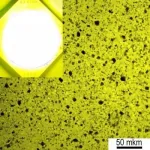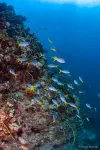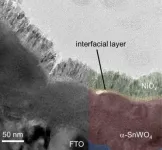Genetically-modified mosquitoes key to stopping Zika virus spread
2021-01-26
(Press-News.org) COLUMBIA, Mo. - In 2016, the World Health Organization called the Zika virus epidemic a "public health emergency of international concern" due to the virus causing birth defects for pregnant women in addition to neurological problems. Since then, researchers have wrestled with different strategies for controlling the spread of Zika virus, which gets transmitted to humans from female mosquito bites.
One approach, which was approved by the Environmental Protection Agency in May, will release more than 750 million genetically modified mosquitos into the Florida Keys in 2021 and 2022. These "suicide mosquitos" are genetically-altered to produce offspring that die before emerging into adults and therefore cannot bite humans and spread disease.
However, wiping out future generations of mosquitoes may cause environmental complications, such as potentially disrupting food chains. A new research study at the University of Missouri offers another option: genetically modifying mosquitoes to be resistant to Zika virus altogether.
Alexander Franz, an associate professor in the MU College of Veterinary Medicine, collaborated with researchers at Colorado State University by using CRISPR gene-editing technology to produce mosquitoes that are unable to replicate Zika virus and therefore cannot infect a human through biting.
"We genetically manipulated these mosquitoes by inserting an artificial gene into their genome that triggers one of the immune pathways in the midgut to recognize and destroy the RNA genome of Zika virus," Franz said. "By developing these mosquitoes that are resistant to the virus, the disease cycle is interrupted so transmission to humans can no longer take place."
Franz added that the genetic modification is inheritable, so future generations of the altered mosquitoes would be resistant to Zika virus as well.
"We are interested in strategies for controlling insect vectors like mosquitoes that transmit various viruses affecting human health," Franz said. "Public health experts suggest having a toolbox with different approaches available to tackle a virus such as Zika, and unfortunately right now there are limited options. There is no vaccine for the Zika virus widely available and spraying insecticides has become ineffective since the mosquitoes can develop resistance, so we are simply trying to expand the toolbox and provide a solution by genetically modifying the mosquitoes to become Zika-resistant while keeping them alive at the same time."
Franz' research is designed to help prevent another outbreak of Zika virus disease from occurring.
"If you can ever find a way to block the transmission of a pathogen that negatively affects humans, that is good news," Franz said. "We have shown this is a viable option for genetically modifying mosquitos in a lab setting. There would need to be thorough discussions about regulatory compliance to see if this can be a solution out in the field down the road, and who knows when another Zika outbreak might happen in the future, which is why this research is so important."
INFORMATION:
"The Antiviral Small-Interfering RNA Pathway Induces Zika Virus Resistance in Transgenic Aedes aegypti" was recently published in Viruses. Co-authors on the study are Adeline E. Williams, Irma Sanchez-Vargas, William R. Reid, Jingyi Lin and Ken E. Olson. The study was funded by the National Institutes of Health.
[Attachments] See images for this press release:

ELSE PRESS RELEASES FROM THIS DATE:
2021-01-26
An international research collaboration, involving scientists from the UK, US and Spain, has shed new light on the usefulness of digital contact tracing (DCT) to control the spread of Covid-19.
The study, published today in Nature Communications, assessed the effectiveness of the Spanish DCT app, Radar COVID, following a 4-week experiment conducted in the Canary Islands, Spain between June-July 2020.
For the experiment, funded by the Secretary of State of Digitalisation and Artificial Intelligence (SEDIA), the researchers simulated a series of Covid infections in the capital of La Gomera, San Sebastián de la Gomera, to understand whether the Radar COVID app technology could ...
2021-01-26
Individual variations in how the immune system responds to SARS-CoV-2 appear to impact the severity of disease. Researchers at Karolinska Institutet in Sweden have now been able to show that patients with severe COVID-19 have significantly elevated levels of a certain type of immune cells in their blood, called myeloid-derived suppressor cells. The study published in the Journal of Clinical Investigation may bring an increased understanding of how early immune responses impact disease severity.
Most individuals with COVID-19 develop mild to moderate symptoms and recover without needing hospital treatment. In severe cases, however, COVID-19 can lead to respiratory failure or even death. It is not yet known ...
2021-01-26
Materials scientists of Far Eastern Federal University (FEFU), in collaboration with an international research team, have advanced the design of composite ceramic materials (Ce3+:YAG-Al2O3), i.e. solid-state light converters (phosphors) that can be applied in-ground and aerospace technologies. The LED systems based on the developed materials to save 20-30 percent more energy compared to commercial analogues. A related article was published in Materials Characterization.
Over 15% of the total global electricity production or about $ 450 billion annually spent on lighting. According to the photonics development roadmap run in Russia, the development of LED technology with an efficiency of more than 150 ...
2021-01-26
Canada could be sitting on a significant untapped resource, as the number of PhD holders in this country rises, but persistent barriers make it hard for them to put their skills to work. According to a new expert panel report from the Council of Canadian Academies (CCA), PhD graduates play a critical role in the Canadian economy, but many are missing out on important opportunities to contribute their expertise and bolster growth and innovation.
"The growing number of PhD graduates in Canada could represent a significant opportunity to drive innovation and increase our competitiveness in a global economy," said M. Elizabeth Cannon, O.C., PhD, FRSC, FCAE, Chair of the Expert Panel. "The difficulties graduates face raise important questions about the nature of PhD ...
2021-01-26
"74 percent of the respondents consider the national vaccination strategy to be appropriate," says BfR-President Professor Dr. Dr. Andreas Hensel. "This indicates that the strategy is accepted."
While some regulations, such as the cancellation of events or the quarantine measures, have always been met with approval in recent months, other measures are now less accepted. Whereas shortly before Christmas, 84 percent of the respondents considered the contact restrictions to be appropriate, 74 percent say so in the current survey. Over the same period, approval of the closure of shops fell by ten percentage points to 56 percent.
In the previous ...
2021-01-26
BROOKLYN, New York, Monday, January 26, 2021 - Atomically thin, 2D hexagonal boron nitride (h-BN) is a promising material whose protean ability to undergo phase transformations to strong, super lightweight, chemically stable, oxidation-resistant films makes them ideal for protective coatings, nanotechnology thermal applications, deep-UV light emitters, and much more.
The possibilities embodied in different polytypes of h-BN include the ultra-hard diamond phase, a cubic structure (c-BN) with strength and hardness second only to actual carbon diamonds. Key to fabricating such materials is the ability to induce and control the transformation between their various crystalline phases, in a way that is efficient and cost effective enough to allow for economies of scale.
While ...
2021-01-26
An international group of scientists is predicting markedly different outcomes for different species of coral reef fishes under climate change - and have made substantial progress on picking the 'winners and losers'.
Associate Professor Jodie Rummer from James Cook University's ARC Centre of Excellence for Coral Reef Studies co-authored a study that exposed two species of coral reef fishes to elevated temperatures and measured their responses over time.
"We collected five-lined cardinalfish and redbelly yellowtail fusilier from the Great Barrier Reef, and under controlled conditions in the laboratory at JCU, slowly raised the temperature ...
2021-01-26
The scientific process is an iterative and collaborative journey. Research is published, others can weigh in on results, and hypotheses can be corroborated, refuted, or further refined and tested. Though it may seem like second guessing or perhaps become contentious in some cases, this often overlooked aspect of the scientific method makes science better by continuing to challenge scientific assertions, thereby expanding and deepening our understanding.
An example of this process has been published today in Proceedings of the National Academy of Sciences, in a collaboration between researchers from Louisiana State University, the University of Puerto Rico, and UConn. This new paper is a follow-up to an earlier response published in the same journal in 2018 that told of a collapsing ...
2021-01-26
Hydrogen is an important factor in a sustainable energy system. The gas stores energy in chemical form and can be used in many ways: as a fuel, a feedstock for other fuels and chemicals or even to generate electricity in fuel cells. One solution to produce hydrogen in a climate-neutral way is the electrochemical splitting of water with the help of sunlight. This requires photoelectrodes that provide a photovoltage and photocurrent when exposed to light and at the same time do not corrode in water. Metal oxide compounds have promising prerequisites for this. For example, solar water splitting devices using bismuth ...
2021-01-26
In a study of 500 sourdough starters spanning four continents, scientists have garnered new insights into the environmental factors that contribute to each sourdough starter's microbial ecosystem, and how different types of microbes influence both a sourdough's aroma and how quickly the sourdough rises. The results may surprise sourdough enthusiasts.
"We didn't just look at which microbes were growing in each starter," says Erin McKenney, co-author of the paper and an assistant professor of applied ecology at North Carolina State University. "We looked at what those microbes are doing, and how those microbes coexist with each other."
"There have been quite a few small studies on microbial ecosystems in sourdough," says Benjamin Wolfe, co-author of the study and ...
LAST 30 PRESS RELEASES:
[Press-News.org] Genetically-modified mosquitoes key to stopping Zika virus spread






